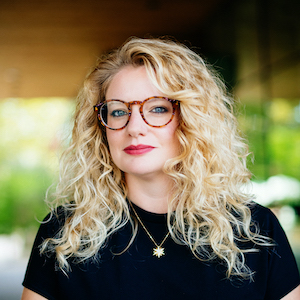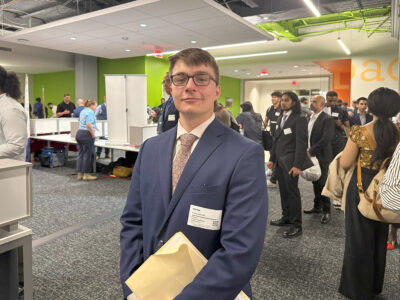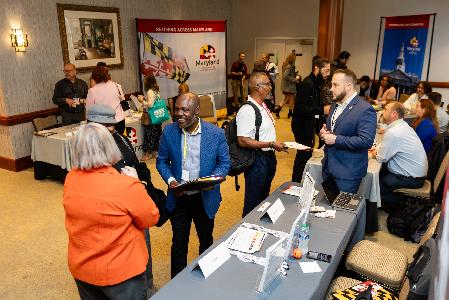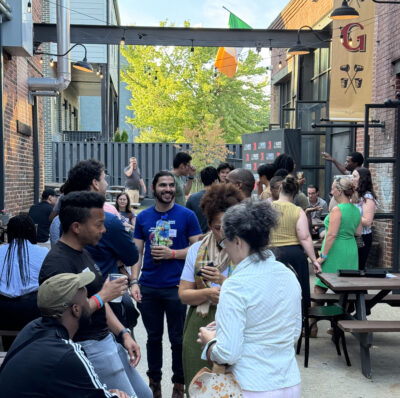Having chosen Baltimore to be her college town, Ashley Jean took her double major in Accounting and Information Systems to T. Rowe Price after graduation. But a Bmore on Rails workshop sparked her creative drive to code, provided mentors who would become great friends and connected her with the tech community. After two years of self-study, Jean made the career change from accounting to junior developer. Now a Software Engineer at Station North’s mdlogix, Jean works with a team building behavioral health technology.
Jean’s career has been driven by deciding her own “defining moments.” She sees that without overcoming challenges like moving to a new city, teaching herself to code, and being laid off, she would not have made it to where she is now.
“You have to sharpen that muscle of endurance, even when the going gets tough and you have a big fall or a big failure, not letting that be the defining moment in your career but allowing that to be the fuel that propels you to move forward,” Jean said.
We spoke with Jean about how she made the transition from accounting to software development in 2016.
This conversation has been edited for length and clarity.
Tell us the highlights of your career so far. How did you get to where you are now?
I am originally from New York and came to Baltimore to go to Loyola University for undergrad. I was headed the CPA route and I got a job offer at T. Rowe after graduation, where I was working in portfolio accounting and managing our systems. I was responsible for making client reconciliations for T. Rowe’s holdings for clients, essentially giving clients a brief overview of what their holdings are for their fund the previous month, and that’s sort of how accounting works because you are always looking at prior months as opposed to finance which is looking at the future side.
I really liked my job, but I attended a Bmore on Rails Workshop for Women that I found on Meetup. I had just moved back to Baltimore and I was looking for some community and for some new friends, just looking to network. I went to the workshop and I fell in love with the people and the coding and the environment. It had been a while since I was in an environment that sparked so much curiosity, and I wanted to tap more into my creative side and I feel like coding really lent itself to that. After that weekend, I was so hungry to learn more.
I met some folks in the workshop that ended up being my mentors, and this turned into two years of attending meetups and doing little workshops here and there, and learning how to code part time while still working at T. Rowe Price. I would read books, watch YouTube tutorials and build small applications. Through that I was able to land a two month fellowship through Rails Girls Summer of Code, where I was able to work on an open source project with mentorship. That experience allowed me to be able to apply to coding jobs. I landed at STAQ for a brief period of time and am now at mdlogix. This has been a whirlwind of an experience definitely with some turbulence, but I am really happy about my story because it’s shows there’s not necessarily this narrow path into tech.
I didn’t learn how to program in the traditional way. I didn’t start at five years old and I didn’t get a bachelor’s degree in computer science. I learned because the community stood by me. I feel that it is my duty to give back to that same community because it has to be a domino effect — if we want more people, especially people of color, to be in the tech field we need to give back. That’s why I stay involved. I was a co-organizer of the Baltimore Hackathon this past March, I’ve helped with volunteering at the Bmore on Rails Workshop twice after I attended that first time myself, and I sit on the industry advisory board for Code in the Schools.
Since you had this big community-driven jump, what are some of those skills from your previous world that still impact you now?
As one of the software engineers, where essentially what I do is to deploy code whether it is by fixing bugs or working on feature tickets, I spend a lot of time collaborating with the team. And the skills of how to effectively work in a team, those skills transfer no matter what industry you work in. When I was working in finance we would be under stressful, tight deadlines, and being able to effectively communicate with your teammates if you needed help or if you could collaborate in a different way is definitely helpful. When I think about my role now, we have some of our team that is working remotely, being able to communicate and collaborate effectively in many different ways, makes it easy to make them feel like they are in the room — especially when we do things like pair programming where two devs are working on a problem or on a ticket or feature together. We tend to overlook communication skills, but they are a key win to any type of industry that you want to work for.
Why did you take this job, why did you join this company, what about it keeps you so motivated?
At mdlogix, we build applications surrounding behavioral health integration and chronic care management. Our applications provide organizations with the tools necessary to help patients with the right behavioral health services and the process management tools to manage the cases. Organizations and researchers can create studies and track the data of those studies using data analytics in our application; we use Elasticsearch and Kibana. It’s really interesting work. We just had our Company Update meeting, and the team shared how one of our clients, the Institute for Integrative Health, is using art as a way to cater to the needs of veterans who are rehabilitating themselves. Through our product, Vet Arts Connect is able to track the progress of veterans through the art program. We were all tearing up over our pizza today. It’s just such a feel good moment to see, as a team, how our application is out there having an impact.
As a junior dev at the time I was just so thrilled to have the opportunity to work with such a seasoned team of developers and it definitely enticed me to learn new tools and new approaches that as a developer I didn’t have experience with. But when it comes to why I stay, it’s definitely the people. I am really grateful that I work with such a great group of individuals that just want to do good work, not only within our company but just as a community as a whole. It’s the stories where we’re doing work that not only is helping people with behavioral health issues, but veterans at ArtVets or doctors at Johns Hopkins using our application for cancer research. It’s the impactfulness of our work keeps me wanting to stay, it gets me emotional.
What is some advice that you would give to people who are looking to go from non-technical roles into technical roles?
The main thing is chasing those dreams that scare you. Because you never want to be complacent. If it scares you, I always say to do it. And I definitely do that maybe a little bit too much now, but I think that you have to sharpen that muscle of endurance, even when the going gets tough and you have a big fall or a big failure, not letting that be the defining moment in your career but allowing that to be the fuel that propels you to move forward. I just think about how I’m in my second year of almost completing my master’s in computer science at Towson, and I know I wouldn’t have gotten to that point if it wasn’t for my layoff from STAQ.
I was there for five months, and after being at T. Rowe for 2 and a half years, I was in this place where I knew it wasn’t my fault, things happen with startups, and I didn’t want this to be my defining moment. If it hadn’t been for STAQ downsizing, I wouldn’t have applied for my master’s program. I was on the ground, I had mud on my face, and I was like, well, what’s it going to be? Are we going to go back into finance or are we going to keep chasing this dream? I’m really glad that I listened to my intuition and that I kept going.
It was the same thing when I was learning how to code. Loved ones were saying are you sure you want to do this after going to school for 4 years and you are on this trajectory to become a CPA? And I was like yeah, I like coding and I think there is a lot of opportunity here. It has to feel right, there’s a feeling, especially as women we have good intuition and you know sometimes we have to listen to our intuition a bit more because we know it’s going to lead us to the right decision.
There’s no narrow road to success, it’s challenging, as long as you know that what you’re doing is worth it, you keep chasing it. It only takes one person to be your mentor and support you, without Brigitte Warner, Tash and Ali Ibrahim and Jamie Gaskins, all of whom I met at that first workshop and who are now my great friends, I would never be here now. Plug in to the community, join meetups, go to events. Everyone in Baltimore is super friendly. I am really grateful I was in a place where I was so connected in the community and I was so hungry for a change and I didn’t let anything get in my way. That’s the main thing it’s all mental.
What is the one thing that you do for yourself every month that keeps you charged up?
I know that I can definitely use some work in this area, but for me it is making time with loved ones. Doing things like planning a nice mini-excursion with my boyfriend, or making time to visit with my family. The other thing is working out and just using that time to be with myself, and making time to be still without over-booking my schedule. Too often I fill it to the brim, and I know that I need time to just be.
Connect with Jean on LinkedIn or email her at ajean@mdlogix.com

This editorial article is a part of Technical.ly's Career Trajectory Month of our editorial calendar.
Before you go...
Please consider supporting Technical.ly to keep our independent journalism strong. Unlike most business-focused media outlets, we don’t have a paywall. Instead, we count on your personal and organizational support.
Join our growing Slack community
Join 5,000 tech professionals and entrepreneurs in our community Slack today!





